
Hormonal disorders - What are they and how do they manifest?
The human body would not function without them, and yet they are among the body's greatest mysteries. We call them hormones, and their name comes from the Greek "horman/hormanus" and translates as to set in motion, to wake up. In reality, this is their role, to initiate and support important processes in our body.
The key word when talking about hormones and how they influence our health is balance. What happens when a hormone is in excess or deficiency in the body and how does it affect our lives? We're telling you right now everything you need to know.
What are hormonal disorders?
Hormones are chemicals that coordinate different functions in your body by sending messages through your blood to your organs, skin, muscles, and other tissues. These signals tell the body what to do and when to do it. Basically, your life and health rely a lot on hormones.
Scientists have so far identified more than 50 types of hormones in the human body.
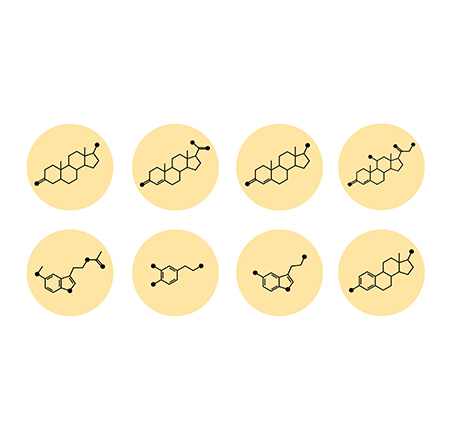
Hormones and most of the tissues (mainly the glands) that create and release them make up what we call the endocrine system. Among the processes influenced by it are:
metabolism
homeostasis (constant internal balance)
growth and development
sexual function
reproduction
the sleep-wake cycle
disposition
Our body knows very well what amount of each hormone will be beneficial for carrying out daily activities. Therefore, when we lead a balanced lifestyle, the glands secrete exactly the amount of hormones we need.
At the opposite end, there are hormonal imbalances, that is, the exceptions when the flow of hormones is either too little or too much and an imbalance occurs in the body. These fluctuations can occur:
short-term: caused by changes in diet or sleep schedule
in the long term: they can be chronic and need appropriate treatment
Such disturbances also often occur naturally with aging and the normal transformation of the body.
Types of hormonal disorders
We know, then, that hormones have a particularly important role in the development and proper functioning of the body, and that we want to maintain their flow within certain parameters. But what hormones are we talking about, exactly? Among the most important, we mention:
THYROID HORMONES (T3 and T3)
Agents of metabolism, they deal with the transformation of food into energy for the body. They are also important agents in the management of emotions, the good development of the nervous system, the brain and even the systems that deal with the contraction and relaxation of muscles.
The symptoms in case of a malfunction are:
gaining weight
hair loss
constant fatigue
dry skin
constipation
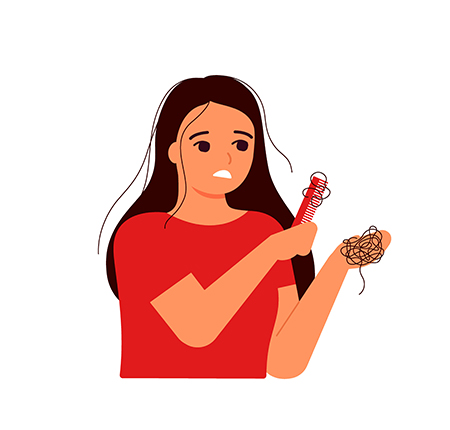
GROWTH HORMONE
It is released less and less with age and is responsible, as the name suggests, for the growth and development of the body (height, for example). Growth hormone reaches maximum levels at night, during the first hours of sleep, hence the idea that little ones grow the most when they sleep.
Signs of a hormonal imbalance include:
fatigue
weakness in the body
dizziness
fat deposition in the abdomen
cortisol
The "stress hormone", as it is most commonly known, cortisol is responsible for energy levels, tension, as well as calming the body down to the wake-sleep state. It has an important contribution to the management of macronutrients and blood sugar.
In the event of a malfunction, the following occur:
acute anxiety and depression
weight gain, especially in the abdominal area
general weakness
dizziness
nausea
low voltage
weight loss
ESTROGEN
From the "hormones that change my body" series, we cannot omit estrogen. Associated with the major transformations of puberty, such as menstruation and the development of sexual organs, it plays a particularly important role in the lives of girls and women.
An imbalance can occur especially in menopausal women or those who have just given birth. Signs of a hormonal imbalance include:
fatigue
Hot flushes
atrophy and vaginal dryness
lack of concentration
decreased libido
possible pain during intercourse
PROLACTIN
The duties of this hormone include the production of breast milk during the nursing of the newborn. The prolactin level gradually increases during pregnancy and decreases during the first two weeks after birth. So, we often associate this hormone with changes specific to pregnancy and the processes immediately following it (breastfeeding and lack of ovulation during it).
The symptoms of a hormonal disorder in the case of prolactin are:
headaches
infertility
irregularities of the menstrual cycle
the appearance of breast milk outside the period of breastfeeding or pregnancy
TESTOSTERONE
Although considered a male hormone due to the essential role it plays in their reproductive system, testosterone is also secreted in women. He has, in our case, an important influence on libido and sexual pleasure.
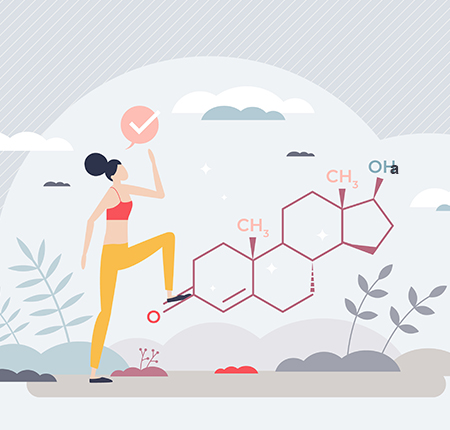
In the event of a malfunction, it appears:
thinning hair
acne
irregular menstrual cycle
decreased libido
malaise
vaginal atrophy (vaginal dryness, itching, burning, pain during intercourse)
melatonin
The reason why movies make us fall asleep and the culprit when we can't fall asleep is the hormone called melatonin. It sends signals to the brain about sleep and is influenced by light - the less, the more hormones are secreted. It is closely related to the circadian clock, which divides the 24 hours into sleeping and waking time.
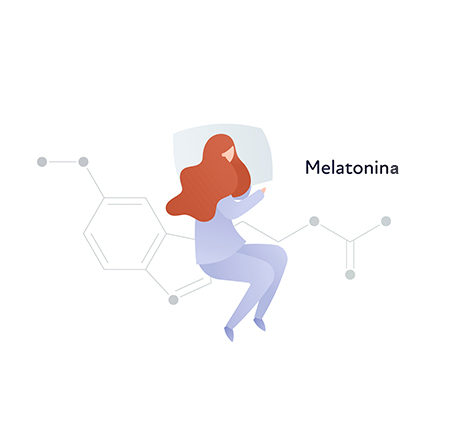
The signs of a hormonal imbalance are quite obvious:
in excess - we will always be sleepy
in the absence - we will not be able to sleep
INSULIN
Insulin is secreted by the pancreas and deals with blood glucose, while also controlling how the body breaks down food and turns it into energy. Too little or too much insulin will mean hyperglycemia or hypoglycemia, respectively, which further determines whether the person in question suffers from type 1 or type 2 diabetes.
In the case of a disturbance in the insulin level, we recognize the symptoms according to the type of diabetes:
type 1 - the feeling of thirst, high level of glucose in the urine and weight loss,
type 2 - frequent urination and high level of glucose in the urine
Hormonal disorders - Symptoms
As for hormonal disorders in general, they can be of many kinds. The symptoms differ from case to case, but among the first ones that can signal an imbalance are:
- sudden weight loss or gain
- thinning hair
- the appearance of pilosity (hair) in various areas of the body
- chronic fatigue
- sleepiness
- dry skin
- hair loss
- irregular menstrual cycle
- anxiety
- depression
- decreased sexual appetite
- vaginal dryness
- drastic increase or decrease in appetite
- sweating during sleep
- frequent/sudden mood swings
Hormonal disorders that affect metabolism
We often hear talk around us about metabolism and how good it is for it to be as fast as possible. What is he actually?
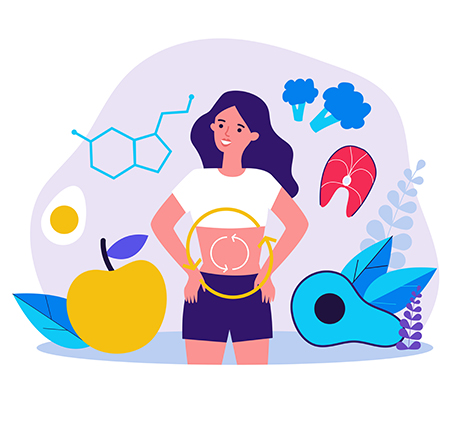
Metabolism is a chemical process by which the body turns food into "fuel". The faster it is, the easier the burning happens, and the more energy we get. There are a variety of symptoms that indicate impaired metabolism:
slow heartbeat or fast heartbeat (tachycardia)
unexplained weight gain or weight loss
fatigue
constipation
diarrhea or more frequent bowel movements
numbness and tingling in the hands
higher than normal blood cholesterol levels
depression or anxiety
intolerant of cold or hot temperatures
dry, rough skin and hair
thin skin, warm and moist
uneven distribution of body fat
dark skin in the armpit (underarm) area or the back and sides of the neck
extreme thirst and frequent urination
Hormonal disorders that affect women
The imbalance in estrogen, progesterone and even testosterone is typically female. It can occur at any age, but times like menopause or childbirth increase the predisposition to hormonal imbalances. We observe slight fluctuations in the level of these hormones even throughout a menstrual cycle.
A hormonal imbalance is manifested in women by:
excessive hairiness
hair loss
acne on the face, chest and back
loss of sexual appetite
atrophy and vaginal dryness
Hot flushes
infertility
irregular cycle
Hormonal disorders that affect men
In the case of men, the most common hormonal imbalance concerns testosterone, secreted by the testicles. Thus, they can present as symptoms:
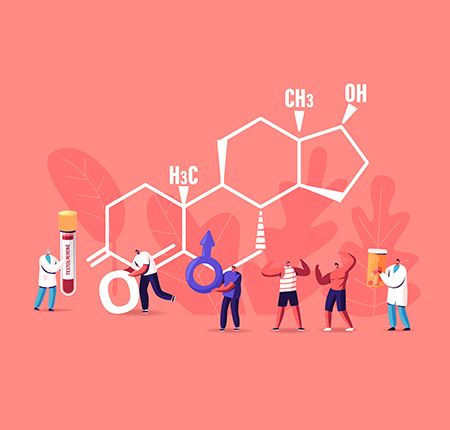
erectile dysfunction
decrease in muscle mass
decrease in sexual appetite
infertility
loss of body hair
When should you see a doctor?
Many times, the symptoms of a hormonal imbalance are very likely to go unnoticed by the person experiencing them, either because they are considered relatively normal passing episodes or because they are ignored. However, it is very important to talk to our doctor as soon as we notice changes in our body.
Hormones are not visible components of the body, which may lead us to treat them with indifference, but their role and balance remains essential. The sooner we go to the doctor, the more we can stop and even prevent an unwanted situation.
Hormonal disorders - Causes
Throughout life (and even throughout the day), hormone levels naturally rise and fall. Certain periods of life cause more dramatic changes and fluctuations in hormones, including:
- puberty
- task
- menopause
However, there are several other reasons why hormone levels can be erratic at unexpected times. Some of the most common causes of fluctuating or unbalanced hormone levels include:
stress
certain medications
steroid use
unhealthy or unbalanced diet
inconsistent sleep
radiotherapy
chemotherapy
These hormonal imbalances are more likely to be temporary or fixable with a change in medication or proper stress management.
As for chronic hormone-related conditions, they can have many different causes. In general, the main conditions or situations that cause medically significant hormonal imbalances are:
tumors, adenomas or other growths - are formed in the glands or cells that produce hormones and can cause hormonal imbalances;
damage or injury to an endocrine gland - any kind of damage or injury to an endocrine gland can cause hormonal imbalances, usually a lack (deficiency) of hormones;
autoimmune conditions - Hashimoto's disease, Graves' disease, type 1 or 2 diabetes, Addison's disease.
How can hormonal imbalance affect you?
Having too much or too little of a hormone increases the body's risk of deviating from its typical processes over a shorter or longer period of time. Just as hormones can fluctuate within normal parameters, they can exceed these limits, leading to conditions such as:
- ADULT ACNE - happens when hormonal changes affect the natural oils produced for the face. It is most common during menopause, during pregnancy and in those taking testosterone treatments.
- OBESITY - several hormones, such as cortisol, send signals to the brain that the need or desire for food has arisen. Therefore, when these hormones are in abundance, they can cause weight gain.
- INFERTILITY - occurs, in both women and men, when the sex hormones (estrogen and progesterone, respectively testosterone) are not present in the amount required by the body.
- DIABETES - determined by insulin (produced by the pancreas), this condition occurs when too much or too little of this hormone is secreted.
Diagnosis - Hormonal disorders
As a rule, analyzes of hormones are done with the help of blood tests. As the level of certain hormones can vary greatly during the course of a day, additional tests may be needed (depending on the case) to make sure that the medication given is correct. All other health conditions and medical history will always be considered.
Hormonal disorders - Treatment
Treatment for hormonal imbalances will always depend on the type of imbalance and the hormone affected. So, most of the time, if you don't have the required amount of something, you will most likely be prescribed pills or injections that will supplement that hormone. If too much of that hormone is secreted, surgery or radiation therapy may be needed.
Prevention - Hormonal disorders
As many prefer to be cautious rather than have to fight the problem, here's how you can minimize the risks:
a healthy diet, including all types of food in moderate amounts
regular sport
maintaining a healthy weight
managing stress levels
a good sleep schedule
quitting smoking and any other nicotine product
Hormonal disorders in adolescents
Teenagers experience hormonal imbalances organically because it is a time when their bodies are changing. We are talking, in particular, about estrogen and progesterone in girls and testosterone in boys.
In the context of these transformations, it is important that the lifestyle is as balanced as possible because an unhealthy diet or lack of sleep can have visible effects on developing bodies. The release or inhibition of certain hormones at such an important stage of development can have long-term effects, so it is a time when it is best to be cautious and watch what we consume.
Hormonal disorders in young children
Hormonal disorders in young children are all the more serious because, if not treated in time, they can mark normal development and growth. As in the other cases, these disorders can have more or less obvious symptoms, and among the most common are:
stunted and slow growth
unexpected changes in mood and behavior
fluctuating blood pressure and heart rate
imbalance in appetite and weight, difficulties in gaining weight within normal parameters
In such cases, the fastest and most effective solution is for the little one to be taken to an endocrinologist for more thorough analyses.
Frequently asked questions
Now is the time to answer the most frequent questions about hormonal disorders.
Can hormonal disorders influence the flow of menstruation?
Hormonal imbalances can also be responsible for unwanted changes in the menstrual cycle and menstrual flow. For example, when too much testosterone and androstenedione are secreted, women may experience irregular, longer, or painful periods. Because we want you to feel comfortable in your body even on sensitive days, when the balance seems to be thrown out of whack, we created Enroush products from 100% organic materials , without chemicals, perfumes or plastic. Our absorbents, tampons and panty liners made of 100% organic cotton, friendly to you and the planet, meet your feminine needs without endangering your health. We want you to contribute to a transparent and clean world where women feel good and put health care first.
Can hormonal disorders influence weight gain?
Hormonal imbalances can influence both weight gain and weight loss. For example, when we feel stressed, our brain releases cortisol, which sends signals to the brain closely related to food, causing us to eat much more or much less. In the long run, these reactions and habits can really influence weight.
Can hormonal imbalances cause anxiety?
Hormonal imbalances can affect your mood and can certainly cause anxiety. This is because, in addition to the functions that hormones have on a physical level, they can determine a large part of our mood. Just as we may feel excited or energized after eating chocolate due to an immediate surge of serotonin, we may experience anxiety when too much thyroid hormone is released.
Are hormonal disorders specific only in adolescence?
Contrary to expectations, hormonal disturbances are not only specific to teenagers! This popular idea is based on the natural hormonal changes that occur during that time, but fluctuations can occur at any time. During pregnancy, menopause, and even menstruation, hormones can be thrown out of whack, and when we don't pay enough attention to diet, sleep, and exercise, we can trigger an imbalance ourselves. Therefore, the recommendation of doctors is to be as consistent as possible in our good habits.
Can the lack of sex life lead to hormonal disorders?
In addition to pleasure and reproduction, sex has the role of regulating the level of many hormones in our body. Thus, after a long period without sexual activity, the body can suffer. If, for example, the estrogen and progesterone in the woman's body are no longer released in the body to fulfill their other functions, the stress level can increase too much and it does not even help the orgasm anymore. One thing is certain - a healthy sex life plays an important role in hormonal balance.
If you have hormonal disorders, can you get pregnant?
Regarding pregnancy, conceiving a child depends directly on the menstrual cycle, as it also determines the most fertile moments. When we experience hormonal imbalances, menstruation is more likely to become irregular, thus affecting fertility. In this case, conception is possible, but it becomes more complicated since it depends on several factors. However, it is recommended to consult a specialist doctor, who knows exactly which hormonal disorder can interfere with pregnancy and which cannot.























